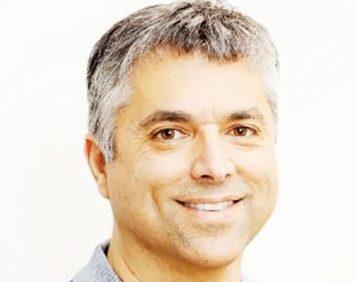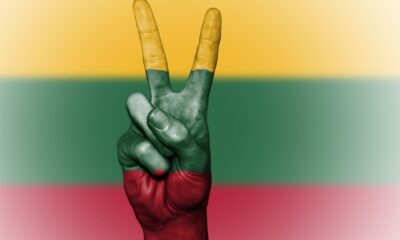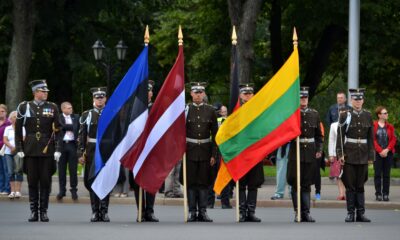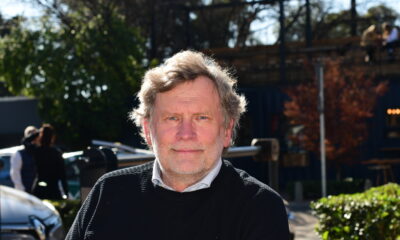
OpEds

My journey to the past
Published
3 years agoon
By
Grant GochinMy grandparents suffered from post-traumatic stress disorder. I grew up witnessing their internal, silent agony. They were victimised by antisemitism, and suffered. As the clouds gathered, they left Europe for South Africa.
My maternal grandmother was rescued from Lithuania, orphaned by murderous pogroms. She was adopted by South African Jews.
Her final words to me in South Africa were, “I wish I knew what my real name was, who my birth parents were, and where I was from.”
My paternal grandmother was driven insane, never escaping her demons of persecution.
My paternal grandfather was deported, starved, beaten, and forced to become a child soldier. His crime? Born Jewish.
Lithuanian government officials deliberately refused to allow his family to return to Lithuania, preventing his family’s rescue, exterminating one more Jewish family. Incredibly, my grandfather survived.
Independently, they migrated to South Africa, later learning that all of their remaining family members were slaughtered in the Holocaust. Generations of my family were destroyed.
My grandmothers never spoke of their lives, I just knew that they were sad and always hungry. It had an impact on every thought and action, questioning every belief.
Grandfather spent his life surrounded by ghosts, sifting through photographs and letters – his memories.
Every day of my childhood, I witnessed my grandparents wrapped in an unspeakable darkness of loss. They relived their persecution, every word and action in their lives interpreted through a veil of victimisation. The ghosts of the murderers and the murdered were constant, mysterious companions.
After their deaths, how could I continue on my way, shirking my inherited responsibility to remember, not reconciling the past horrors with my modern self?
I clung to their memories with very little actual knowledge of their suffering. I became determined to somehow find and cure the disease of misery they suffered.
When Lithuania was liberated from the Soviets in 1990, I was one of the very first people to visit the country.
I walked the streets my grandparents had walked.
I visited the lakes they drank from.
I breathed the air they devoured. I felt warm shrouds of lives.
I have visited Lithuania repeatedly. I sought out Jewish cemeteries. I longed to say Kaddish, as my grandfather had asked of me. I couldn’t find the burial grounds. Most Jewish cemeteries had been plundered, excavated, overgrown, and ruined.
I restored dozens of Jewish cemeteries in Lithuania. With vivid memories of my grandfather, I recited Kaddish. The restoration of cemeteries is a key weapon in the fight against Holocaust denial. Allowing the complete ruin and abandonment of Jewish cemeteries obliterated the last signs of Jewish life. Lithuanians were no longer forced to remember.
My heartfelt work has since been converted by enterprising Lithuanians into tourist sites to lure Jewish visitors. Jewish memory is now a revenue stream for the Lithuanian state.
I applied for restoration of my own Lithuanian citizenship. I realised that I desperately needed a connection to my heritage.
Dishonesty by the Lithuanian government made me research harder, and led to a terrible discovery. The tactics previously used to prevent the rescue of my grandfather’s family from certain death were the same tactics still being used by modern Lithuanian bureaucrats to rebuff me.
Five times, I sued the Lithuanian government to expose its sanctioned antisemitism. I wrote the book, Malice, Murder and Manipulation. Since then, Lithuania seems to have realised that reinstating citizenship to Jewish descendants offers them no risk. The results are positive, a source of business revenue, and tourism. Lithuania has since turned citizenship restoration for Jews into a revenue stream.
Not one member of my grandfather’s family from Lithuania survived the Holocaust.
I remember my grandfather looking at photographs of his family and friends, silently imploring that one would reach out.
I searched for the killing fields where my relatives had been murdered.
I took candles and stones, and recited Kaddish. I placed photographs of his friends, neighbours, and cousins, and if possible, I recited their name and remembered that they were once loved.
Increasingly, I asked, “Who committed the murders?” An answer was, “In this region, it was Jonas Noreika.” I researched Noreika, only to find out that he is hailed as a Lithuanian national hero. I appealed to the Lithuanian government for clarification. I uncovered a widespread yet secret agenda to portray the murderers of Jews as national heroes, denying their crimes.
For a decade, I have worked to expose this Holocaust denial by the Lithuanian government. The case will finally reach the European Court of Human Rights.
In response to my queries, the Lithuanian government has – and continues to – gone to extraordinary lengths to silence me and prevent the exposure of truth.
Lithuania had the highest Holocaust murder rate in Europe.
I have met hundreds of Lithuanians. Most have no idea of their actual history. As happens worldwide, they believe a massive number of Lithuanians risked their lives to rescue Jews. So many told me that their relatives were “righteous gentiles”. In fact, only 0.04% of Lithuanians were rescuers – 917 people out of a population of 2.5 million. Yet, almost every Lithuanian I have ever encountered has informed me of the enormous debt of gratitude that we Jews owe them for their humanity.
Much of current Lithuania is built on the blood of her murdered Jews.
Much of its economy is built on plunder stolen from Jews.
Much of the current business focus of the state is to foment Jewish tourism and investment.
My grandparents died with their pain intact. My grandfather’s last words to me were of his murdered relatives. He calls to me in my dreams to continue searching. I now realise that I absorbed my grandparents’ pain.
I view my own relationships within the legacy of hate, fear, and victimisation. The pain cannot end until the whole truth is acknowledged.
Still today, Lithuania openly honours the perpetrators of my people’s grief as national heroes.
Lithuania is proud of its independence. My grandfather fought in the war to achieve its freedom. In my citizenship applications, his participation, identity, and consequent suffering were all denied. They slandered his service to Lithuania.
Lithuania speaks lovingly of its “lost” Jews. No-one is lost. Murdered remains are within Lithuanian soil. Their blood has fertilised the land, and, perhaps most egregious, there are national monuments to the murderers.
We hear Lithuania speak passionately of peace and reconciliation. These ideals aren’t achievable in an environment of deception. It thinks we Jews are ignorant of our history, and ignorant of its continuing antisemitism. We aren’t.
On this Holocaust Remembrance Day, let’s continue to expose the lies and true sentiments of the Lithuanian government. It must give children accurate information.
I didn’t know that my initial curiosity would become such an obsessive quest.
Let it take down monuments to the murderers, and publicly acknowledge what they did.
Let it finally allow my grandparents and all murdered Lithuanian Jews to be at peace.
Until then, it cannot reach out to Jews. Not before.
- South African-born Grant Gochin is actively involved in Jewish affairs, focusing on historical justice. He has spent the past 20 years documenting and restoring signs of Jewish life in Lithuania. In March 2019, he took the Lithuanian government to court to get it to recognise its active role in the Holocaust.










